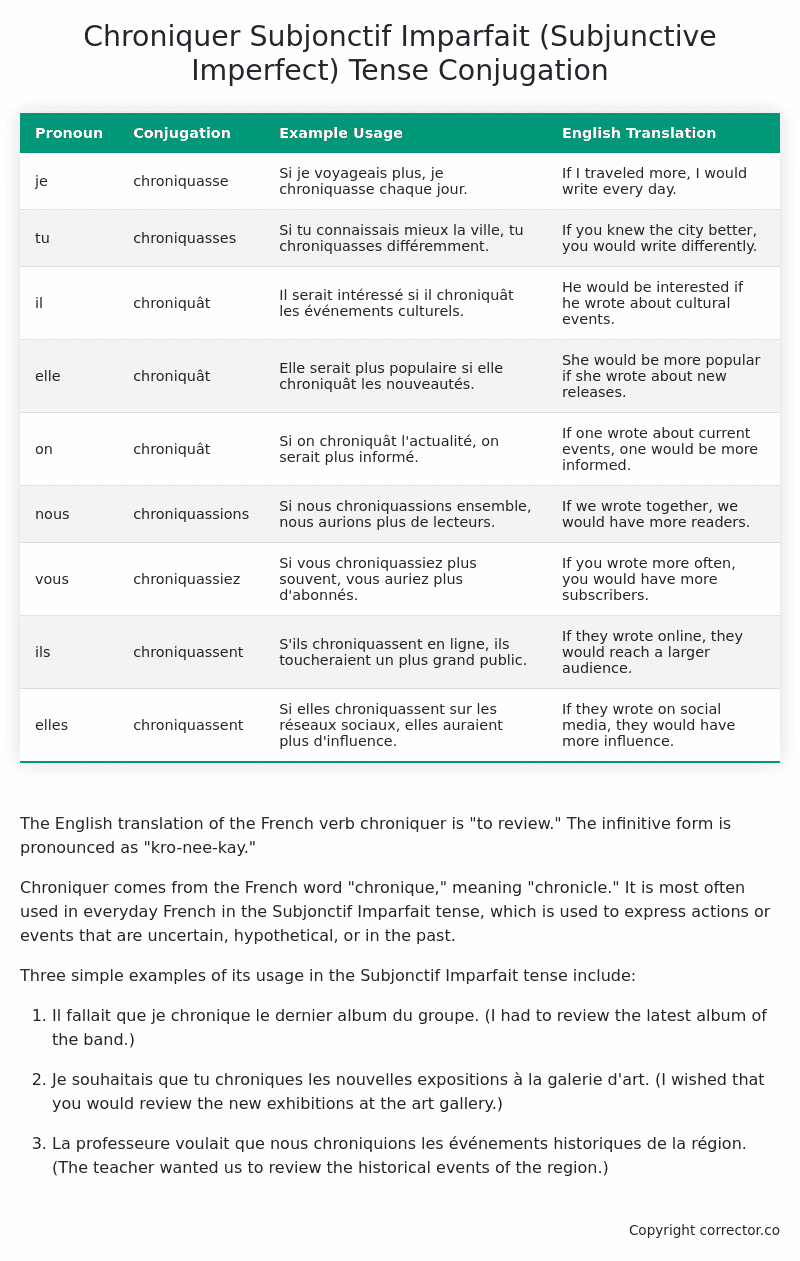Subjonctif Imparfait (Subjunctive Imperfect) Tense Conjugation of the French Verb chroniquer
Introduction to the verb chroniquer
The English translation of the French verb chroniquer is “to review.” The infinitive form is pronounced as “kro-nee-kay.”
Chroniquer comes from the French word “chronique,” meaning “chronicle.” It is most often used in everyday French in the Subjonctif Imparfait tense, which is used to express actions or events that are uncertain, hypothetical, or in the past.
Three simple examples of its usage in the Subjonctif Imparfait tense include:
-
Il fallait que je chronique le dernier album du groupe. (I had to review the latest album of the band.)
-
Je souhaitais que tu chroniques les nouvelles expositions à la galerie d’art. (I wished that you would review the new exhibitions at the art gallery.)
-
La professeure voulait que nous chroniquions les événements historiques de la région. (The teacher wanted us to review the historical events of the region.)
Table of the Subjonctif Imparfait (Subjunctive Imperfect) Tense Conjugation of chroniquer
| Pronoun | Conjugation | Example Usage | English Translation |
|---|---|---|---|
| je | chroniquasse | Si je voyageais plus, je chroniquasse chaque jour. | If I traveled more, I would write every day. |
| tu | chroniquasses | Si tu connaissais mieux la ville, tu chroniquasses différemment. | If you knew the city better, you would write differently. |
| il | chroniquât | Il serait intéressé si il chroniquât les événements culturels. | He would be interested if he wrote about cultural events. |
| elle | chroniquât | Elle serait plus populaire si elle chroniquât les nouveautés. | She would be more popular if she wrote about new releases. |
| on | chroniquât | Si on chroniquât l’actualité, on serait plus informé. | If one wrote about current events, one would be more informed. |
| nous | chroniquassions | Si nous chroniquassions ensemble, nous aurions plus de lecteurs. | If we wrote together, we would have more readers. |
| vous | chroniquassiez | Si vous chroniquassiez plus souvent, vous auriez plus d’abonnés. | If you wrote more often, you would have more subscribers. |
| ils | chroniquassent | S’ils chroniquassent en ligne, ils toucheraient un plus grand public. | If they wrote online, they would reach a larger audience. |
| elles | chroniquassent | Si elles chroniquassent sur les réseaux sociaux, elles auraient plus d’influence. | If they wrote on social media, they would have more influence. |
Other Conjugations for Chroniquer.
Le Present (Present Tense) Conjugation of the French Verb chroniquer
Imparfait (Imperfect) Tense Conjugation of the French Verb chroniquer
Passé Simple (Simple Past) Tense Conjugation of the French Verb chroniquer
Passé Composé (Present Perfect) Tense Conjugation of the French Verb chroniquer
Futur Simple (Simple Future) Tense Conjugation of the French Verb chroniquer
Futur Proche (Near Future) Tense Conjugation of the French Verb chroniquer
Plus-que-parfait (Pluperfect) Tense Conjugation of the French Verb chroniquer
Passé Antérieur (Past Anterior) Tense Conjugation of the French Verb chroniquer
Futur Antérieur (Future Anterior) Tense Conjugation of the French Verb chroniquer
Subjonctif Présent (Subjunctive Present) Tense Conjugation of the French Verb chroniquer
Subjonctif Passé (Subjunctive Past) Tense Conjugation of the French Verb chroniquer
Subjonctif Imparfait (Subjunctive Imperfect) Tense Conjugation of the French Verb chroniquer (this article)
Subjonctif Plus-que-parfait (Subjunctive Pluperfect) Tense Conjugation of the French Verb chroniquer
Conditionnel Présent (Conditional Present) Tense Conjugation of the French Verb chroniquer
Conditionnel Passé (Conditional Past) Tense Conjugation of the French Verb chroniquer
L’impératif Présent (Imperative Present) Tense Conjugation of the French Verb chroniquer
L’infinitif Présent (Infinitive Present) Tense Conjugation of the French Verb chroniquer
Struggling with French verbs or the language in general? Why not use our free French Grammar Checker – no registration required!
Get a FREE Download Study Sheet of this Conjugation 🔥
Simply right click the image below, click “save image” and get your free reference for the chroniquer Subjonctif Imparfait tense conjugation!

Chroniquer – About the French Subjonctif Imparfait (Subjunctive Imperfect) Tense
Formation
Common Everyday Usage Patterns
Interactions with Other Tenses
Subjonctif Présent
Indicatif Passé Composé
Conditional
Conditional Perfect
Summary
I hope you enjoyed this article on the verb chroniquer. Still in a learning mood? Check out another TOTALLY random French verb conjugation!


